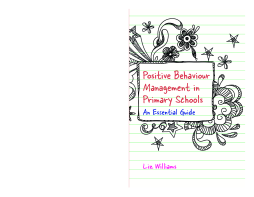
Additional Information
Book Details
Abstract
This highly accessible and much-needed resource sets out practical advice on positive behaviour management in primary schools, exploring how to support children effectively with their personal, social and emotional development.
With an emphasis on implementable strategies, this book will give primary school teachers and staff an understanding as to why children may behave as they do, and what steps can be taken by the school to support a child's development. Considering a variety of factors that influence positive behaviour, such as environment, mental health, parents, and the importance of planning, this book is full of ideas that can be dipped in and out of for support in the classroom. Bite-sized and practical, this is a perfect book for busy teachers.
A thoroughly worthwhile read that should be on all initial teacher training (ITT) essential book lists. It provides no-nonsense, to-the-point advice for all teachers but especially for those who are new to teaching. The advice in this book could take a career to learn and master, yet is here for the taking. It's excellent value for money and time - far cheaper than a course! A positive and practical approach to behaviour management based on tried-and-tested experience and wisdom which has excellent advice for setting up a classroom and managing behaviour within it on a daily basis. Even after 30 years of teaching, I still learned some new strategies by reading this book.
Alison Albion, Headteacher at WLSJ CE Primary School, Lancashire
As a Special Educational Needs Coordinator I find this book invaluable. The book is short enough for professionals to read quickly in its entirety. It is full of good suggestions which in my experience will actually make a difference. I can't recommend it enough.
Be Rimmer, Primary Special Educational Needs Coordinator
Liz's succinct and practical style ensures that this text is accessible to all teaching practitioners. Easily read in one sitting to give an informed overview and a great reference book to aid support with everyday classroom issues. Deep yet accessible, this is a must-read for all those who are embarking on a teaching or teacher support career.
Viv Formby, retired headteacher
Liz Williams is an experienced consultant with excellent knowledge of special educational needs and disabilities (SEND), supporting social, emotional and behavioural needs, nurturing practices, SEND in schools and behaviour systems. She lives in North West England.
At a time when we are being told that there is a worrying increase in the number of young people and children reporting and being identified as having mental health problems, Liz William's book comes as a highly accessible and practical guide designed to help staff in Primary schools to understand the importance of and learn how to promote resilience and social and emotional wellbeing in young children. Without making explicit or becoming over technical, the book draws on a range of underlying theories and approaches, taking a practical 'what works' approach that is likely to be welcomed in schools as the introduction says by 'beginners' and those 'with less experience' and those in search of a quick prompt or reminder.
Chris Watkinson, Educational Psychologist
Table of Contents
| Section Title | Page | Action | Price |
|---|---|---|---|
| Positive Behaviour Management in Primary Schools by Liz Williams | i | ||
| Introduction | 9 | ||
| Chapter 1. Definitions of Behaviour | 12 | ||
| Chapter 2. Why We and Children Behave as We Do | 16 | ||
| Chapter 3. The Importance of Expectations and Teaching Positive Behaviour | 21 | ||
| Chapter 4. Focussing on Primary Behaviours and Least to Most Intrusive Interventions | 26 | ||
| Chapter 5. Rights, Rules and Relationships | 31 | ||
| Chapter 6. Observing Behaviour Within a Classroom | 38 | ||
| Chapter 7. Antecedents, Behaviour and Consequences | 44 | ||
| Chapter 8. Rewards and Sanctions | 47 | ||
| Chapter 9. How Do Schools Teach Self-Regulation? | 52 | ||
| Chapter 10. The Importance of Environments and Their Impact on Behaviour | 55 | ||
| Chapter 11. What We Mean by Nurture | 59 | ||
| Chapter 12. Whole-School Approaches | 63 | ||
| Chapter 13. Additional Needs | 65 | ||
| Chapter 14. The Special Educational Needs Code of Practice and Children with Behavioural Needs | 75 | ||
| Chapter 15. The Importance of Having a Plan When It All Goes Wrong | 77 | ||
| Chapter 16. Supports for School Staff | 79 | ||
| Chapter 17. Ten Very Important Things to Remember | 81 | ||
| Index | 83 | ||
| Blank Page |
